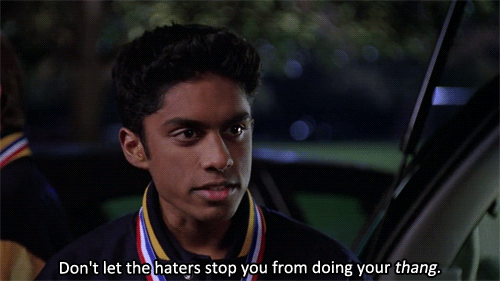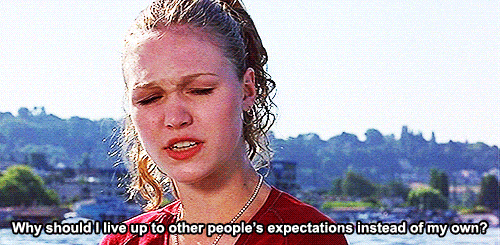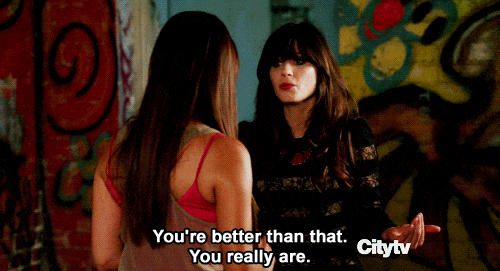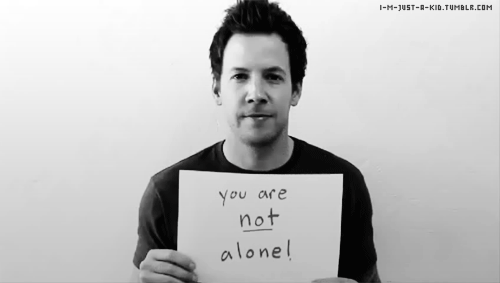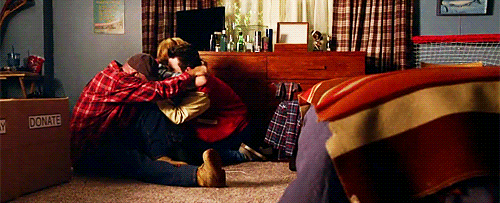Since the beginning of the year, I’ve only been home twice: once for Labor Day and then the second time came for Thanksgiving. It’s not that I don’t enjoy going home — seeing my cats for the first time in a few months as well as my mother and brother is always nice — but in my mom’s current situation, it’s hard to avoid the rest of my family.
Toxic, negative, unhappy — those three words are ones that I have become acquainted with when talking about my family. You can say that my situation could be worse, of course, but constantly hearing them chastise my college of choice, my boyfriend, and nitpicking everything about my life — it wasn’t making me happy, and I don’t have my father to protect me from it anymore.
So I cut them out of my life. I was tired of the lying, the arguments and general unhappiness that came out of every exhausting visit to see them. I didn’t take this decision lightly, but the moment they stormed into my boyfriend’s family’s home (my second family, basically) and yelled, I knew they were holding me back.
If you’re reading this, don’t let a parent or family member hold you back. While the saying goes “you can pick your friends, but not your family,” you can choose to go “no contact” with them. You shouldn’t feel like you have to have them in your life. If a family member manipulates, guilts or otherwise emotionally drains you, cutting them out of your life would be for the best.
This is a heavy decision, but don’t let anyone guilt you out of it — friends might tell you you’re being selfish, other family members might tell you that the toxic family member “can’t help it” or any other excuse to keep you from doing it. But you’re you — you have to stick up for yourself and do what makes you happy. There’s no reason to bare with a family member who hurts you each time you see them.
Unfortunately, most Google search results for “not talking to my parents” are dedicated to consoling family members who have been cut out of another’s life. Most even shame the children who cut the member off, or, like this article from AARP, take the side of the parents, accepting their confusion and judging the family member/child for being “self-absorbed.”
In a world where it’s hard to completely disconnect from someone (and in such a time where family ties are important), you feel compelled and pressured to grit your teeth and deal with your family, no matter if you actually enjoy being around them or not.
But this is wrong. Cutting yourself off from a family member or your family is a very strong decision, and even if you’ve just stopped talking to them, it’s a struggle to keep doing it every day. But you shouldn’t feel guilty at all about your decision.
1. You’re Doing What’s Best For You
You didn’t come to this decision quickly. You didn’t just wake up one morning and decide you wanted to do this — at this point, and in this world, you probably felt like it was the only option to take. If not forever, just for a while. You’re going to have people that are against your decision because they can’t imagine doing that themselves — but do what you want to do.
People’s definition of a “family” differs, even amongst family members. You’re the only one who knows how your family is, you’re the only one that knows what is best for you. You’re the only person who has to live with the aftermath of this relationship with your family members, so you’re the only one whose opinion matters when deciding what choice to make.
2. You’re Your Best Judge
Emotionally abusive or manipulative family members take advantage of their children’s memories, constantly questioning their experiences. Problematic behavior stemming from our family members “never happened,” or that they “did the best they could.” This occurs a lot in arguments — the term for it is “gas lighting” — and I can remember countless arguments with my sister and grandmother where my word differed from theirs, always. As a developing child, this can rack their brain, resulting in them not even trusting their own memory.
But your experiences are real; don’t even let your parents tell you otherwise. Even if they claimed they “did the best they could” that doesn’t mean that they really did — but even if they had, that doesn’t mean that you should be forced to be emotionally scarred by them for the remainder of your life.
You are the only one who knows how your relationship with your family impacts your life; if it’s negative, why should you put up with it? We’re constantly told to get rid of toxic friends, why are family members any different?
3. You Can Have Your Own Support System
While you’re probably going to be told that you’ll “never find a love like a family’s love,” this is very untrue. By cutting off contact with a toxic family member, you can open yourself up to new opportunities that will enable you to accept genuine love and support.
In my life, my sister and grandmother dramatically impacted my relationships with my friends after my dad died. Taking hold of my life, they were suffocating — even my mom was subjected to things they would say, as if they were trying to turn me against her. They spoke badly of my best friends, claiming that they didn’t really think they liked me, and they especially hounded my boyfriend, claiming that he was “manipulative” and “controlling” for no apparent reason. However, as I grew separate from them, I found stronger bonds with people.
I became close with my boyfriend’s family, who are all a bigger support system than any of my family outside of my parents have ever been. In college, I’ve found friends that I feel like I could be friends for life with, and I don’t have to worry about coming home and hearing how “terrible” they supposedly are for me.
Your new support system can come from anyone — friends, a partner, an online or real-life support group, or even a therapist. You will find someone who understands what you’re going through and is willing to stand beside you the whole time.
If this has dramatically impacted you, a good therapist is a great place to start when building your support network — they aren’t just for “crazy” people; therapists are trained to understand things about human relationships that might be hard for other people to understand. Please remember, you aren’t crazy for not liking a family member, and you will find someone else who is going to understand.
4. You’re Not The Only One
While you may feel alone at this particular point, you’re not. Someone somewhere is going through the exact same as you, and a simple Google search can reveal an abundance of support communities for people with toxic family members. For me, personally, I enjoy reading Reddit’s raisedbynarcissists board and the family-based posts in relationships — by simply just reading posts written by people who have had a similar experience to my own is therapeutic to me, and helps me feel less lonely and more concrete with my decision.
There are also a plethora of great essays and articles out there about being an estranged child from your family. This one by Katja Bak is excellent and makes me feel comfortable with my choice. It defines most experiences of pulling away from your family perfectly: "It’s okay to let go of your family. Society tells us that family is number one in your life … [That’s] not always the case. The truth is, they are just people ... They can be bad, and cruel, and toxic — despite being your blood. And it’s okay to walk away. It’s okay. It is okay.”
5. It May Mend Your Relationship
There’s always a chance that your decision of “no contact” with a family member may make them re-evaluate their experiences with you. They may make a total 180-degree turn in their attitude and they may realize how suffocating they’ve been. A break from someone can be a good thing!
But don’t let yourself get overwhelmed with guilt; don’t let yourself succumb to contacting them too early and getting swept back up into the storm, re-opening wounds that were healed during the period of no contact. In today’s society, touching up with a family member again can be tempting and is indeed a natural urge, and you shouldn’t blame yourself for hoping or wanting a change and a close relationship with your family once again. But don’t let that toxicity back into your life unless they’ve actually changed and are willing to treat you better.
Cutting myself off from my family and going no contact has been a hard decision — one that has ground my nerves with guilt and one that has made my heart heavy upon remembering all the good memories I have with my family. We were a close-knit, Southern family, but as I’ve gotten older, I’ve realized how faked the bond was, and ever since I lost my father, I’ve been sucked into the realm of negativity, manipulation and underlying toxicity.
I still talk to my mother and brother — I am still very close to them, and I don’t think i could ever let them go — but I have stopped any contact with the family members outside of them. I don’t criticize my mother’s decision to still speak to them, to still interact with them and go over there for holidays, but I simply will stay home and celebrate them with my cats or second family instead.
Remember, it’s not a mark against you if things don’t work out. It’s not a mark against you if you choose to go no contact with a family member. You aren’t crazy for your decision and you’re definitely not alone. No one — even your own blood relatives — are entitled to your time or energy if they mistreat you.
And just remember:




